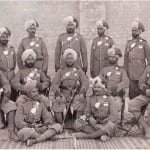Yes, but what about from 1939-45? Surely the Sikhs were extremely loyal during WWII? It is true that Sikhs were heavily over-represented in the largest ever volunteer army raised for WWII (only 2% of India’s population was Sikh). It’s also true that huge sacrifices were made, and acts of great bravery were carried out by Sikhs. However the bravery, and sacrifices stemmed less from loyalty to the British, and more from the Sikh martial culture as inculcated by the Gurus. The numbers of Sikhs that enlisted was also due to the British promising Independence to India if it helped during WWII. Sikhs delivered the brunt of the Indian part of this trade-off.
What is conveniently forgotten is that whilst Field Marshall Slim was praising the bravery of the Sikh soldiers in Burma, the Japanese, and German, governments had actually sponsored, and set up an Indian National Army to fight the British Indian forces. Sikhs made up the majority of the INA, and its first commanding officer was Captain Mohan Singh. Complicated? Yes. Brave? Yes.
Bond of Loyalty? On a personal level, Yes, but overall, No.
The problem for Sikhs really came in summer 1947, when the Radcliffe line divided their beloved Punjab in two, with half in the newly created, and majority Muslim, Pakistan. 60 years later, Sikhs still speak of those dark times of bloodshed, and some animosity towards Muslims remains. But what of the fact that Britain chose a civil servant (Radcliffe) who had never been to India before, told him to draw his line in 5 weeks, most of which he spent in his air conditioned office? What of the fact that his pen strokes were responsible for making 40% of all Sikhs into refugees? A million people died. Was this loyalty?
How many of us turn around and say, You betrayed us in 1849, you betrayed us in 1919, and you betrayed us in 1947, and damn it, we should have expected you’d betray us again in 1984. Why are we the ones who are surprised? Why didn’t we expect this?
(3) We’ve been such loyal citizens, we feel betrayed
When working for the British Empire, Sikhs were loyal. Even now, we are the most integrated, and law-abiding immigrant community in the UK. But how much of this is because of a ‘special relationship’ with the British? Not much.
It’s more likely, because we are generally ‘the good guys’. We’ve been taught by our Gurus to work hard, be honest, share, and stand up for other’s rights. Sikhs make great citizens. It’s more likely that the British recognized this, and grudgingly gave into Sikhs demands to wear a turban and carry a kirpan. By doing this, they were able to retain the goodwill of such a valuable immigrant community.
Its not our style to do wrong anyway, and yet instead of seeing ourselves as a valuable community, and organizing ourselves to take advantage of our value, until the recent scandal, we were still mostly thanking the British for the ‘concessions’ towards the 5Ks. Even now, we turn to them with distraught puppy dog eyes betraying our naivety.
Tags: Historic Political Policies


